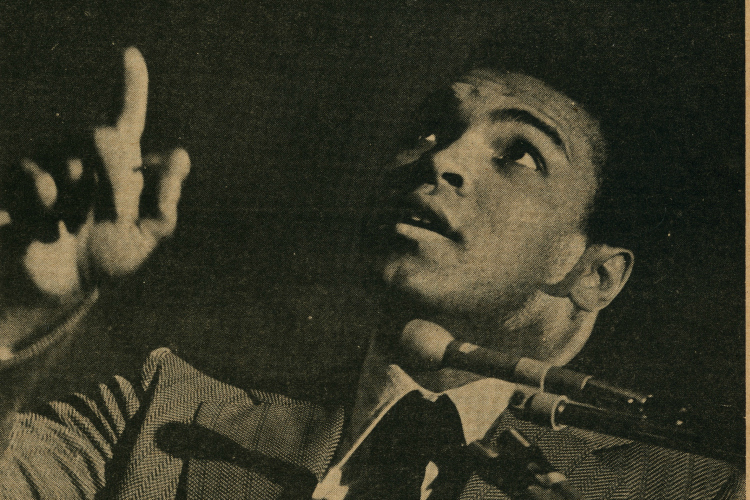Editor’s note: This story was published in the UWM Post on April 2, 1971, two days after heavyweight boxer Muhammad Ali visited the University of Wisconsin-Milwaukee campus. The visit came shortly before the Supreme Court overturned Ali’s conviction for refusing to be inducted into the armed forces in 1967. The Milwaukee Journal also covered Ali’s visit. Ali died June 3 at age 74, and a memorial service is scheduled for Friday, June 10.
Muhammed Ali may have lost the heavyweight title to Joe Frazier, but if the sentiments of his audience are any measure, he’s still the champ.
Ali talked to an enthusiastic crowd of about 800 in the Union Wednesday night as part of a national college tour to keep in “personal touch” with students and fans.
Ali arrived here Tuesday night in his own bus. He and his companions spent the night in the bus, parked in the lot behind Mitchell Hall.
In a press conference Ali said boxing introduced him to the real fight of “freedom, justice and equality for 20 million black people.” His role, he explained, is to lead his people to the teaching of Elijah Muhammed and the black Muslim religion.
Ali was expelled from the Muslim sect of Elijah Muhammed because they do not believe in boxing. He said he intended to quit fighting after his rematch with Joe Frazier, to be held in Los Angeles sometime after the first of next year.
Ali claimed he didn’t lose the last fight, because it was judged on points. He said he watched a slow-motion film of the fight and counted five of his hits to every punch Frazier delivered.
He also stressed that he wanted the next fight judged by international referees, to ensure a fair bout.
Asked if he thought he was destined to be what he is today, Ali answered, “Yes, God blessed me to be the greatest athlete in the world,” and allowed him to champion the true cause, freedom for the black people.
His assessment of the American fight game? “It’s a rough game, but the American people like to see blood and violence.”
After the return bout, Ali said he would quit the ring. He’s been fighting since he was 12 years old, for 19 years. At his lecture later that evening in the Union ballroom, a little boy asked Ali how he became a boxer.
Ali said that when he was 12, someone stole his bicycle and he started training for the day when he would find the thief. The thief was never found and Ali never stopped training.
He said he doesn’t regret being a fighter. “It introduced me to the real fight.”
The real fight, he emphasized, was for black freedom. The fight will be won only with black wisdom.
Integration should be, but first “we (the black people) have to integrate ourselves and we have to become one.” Right now, he said, “we are broken into many pieces.”
In 1971, the racial situation is worse than it was 20 years ago, Ali said.
Ali accused the United States of injustice for the black people. “This country should punish all the way they punish the blacks,” Ali said.
He said is was unjust that George Hamilton didn’t go in the army. When he tried to avoid the draft, Ali lost his championship title and faced imprisonment. His case is on appeal.
Ali said he wouldn’t mind going to jail, because he would be with his brothers.
“I’m ready to die for my people now, but not for someone else (the Vietnamese),” Ali said.
Ali’s day ended with an evening lecture on “The Purpose of Life” in the Union ballroom, packed with about 1,500 fans.
“It’s not action that makes a thing right or wrong, but purpose,” Ali contended.
He also read two poems concerning a black youth whose purpose in life “for was to die fighting.”
After the lecture, Ali fielded audience questions almost as well as Frazier’s punches.
The only question that seemed to give Ali any problem was: Do black people have any obligation to the United States?
“College professors would catch hell for that one,” Ali answered. “It’s according to who you are,” he continued before asking the questioner to restate the question and define “obligation.”
“Do we owe…” the questioner began.
“No,” Ali interrupted, “The U.S. owes us back wages for 400 years of slavery.”
Ali’s visit was sponsored by the center for Afro-American studies and University student government.







